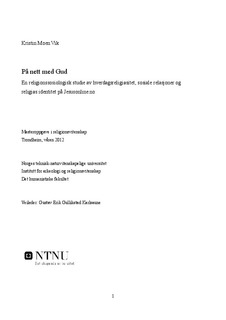På nett med Gud: En religionssosiologisk studie av hverdagsreligiøsitet, sosiale relasjoner og religiøs identitet på Jesusonline.no
Master thesis
Permanent lenke
http://hdl.handle.net/11250/242909Utgivelsesdato
2012Metadata
Vis full innførselSamlinger
Sammendrag
The past 500 years there has been a state church system in Norway. It is therefore possible to speak of an official model when it comes to religion in the Norwegian society, which is represented by The Church of Norway. Lately the church has been loosing members and the attendance at church services are gradually decreasing. In modern Norwegian society there is a growing pluralism of religion. There are also studies pointing towards a more individual and subjective approach to religious experience. These tendencies challenge the authority of The Norwegian Church as mediator of the Norwegian religious expressions. This rises the question of how and where the individuals in Norway express their religious views and form their religious identity.
The basis for this study has been the website jesusonline.no, which is a gathering for Norwegian speaking users that are interested in Christianity. Virtual ethnography was utilized as a method for gathering the analysed material from the discussion board on the site. Considering the relatively high amount of users on the discussion board, and the high activity involvement among the users this site was the one best suited for the purpose of the study.
By studying the communication at jesusonline.no it becomes clear that the Internet is a medium where individuals can express their religious life more freely. There are no systems of religious hierarchy on the discussion board, and the users express themselves in an everyday language with people of the same religious position as themselves. This behaviour can be linked to the combination of features that, to a great extent, is unique to the Internet as a medium, being availability, information, social structure and communication. As a result, lived religion as the term used by Orsi and McGuire, can be observed. Several of the users claim that they are not part of any specific religious community. The authorities of the official model of religion are in this way challenged as the only representative of the truth. Several of the users also say that they rather turn to the discussion board, and the users that are in the same situation as them, to ask for advice rather than to a religious authority of their church.
The discussion board give the users a unique space on the Internet where they can express their religious views and where they can ask others of their kind for advice and guidance. This communication between the users forms a special environment that creates a community feeling among its members. By using the theories of Anthony Giddens, Meredith McGuire, Berger and Luckmann we can certainly claim that the users of the discussion board construct and shape their religious identity in their participation as members of a community.
